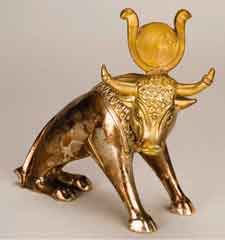A few years ago I started a series on idolatry that I never finished. My original post generated responses from both friends and enemies. At the time I was too shocked by the level of response to continue the series. I had seen too many controversies visa via creation care to continue writing on the topic so I abruptly stopped.
Modern idolatry is hard to write about, because idolatry is a matter of personal practice as much as anything else. Idolatry gets to the attitude of the heart, and, as such none of us are free from our favorite idols. It’s a commandment that goes back to the original 10.
“You shall have no other gods before me” (Exodus 20:3).
Paul takes it up again and again throughout the New Testament.
“Put to death therefore what is earthly in you sexual immorality, impurity, passion, evil desire, and covetousness, which is idolatry” (Colossians 3:15).
Peter calls it lawlessness. Jesus talks about idolatry as a matter of hope and trust.
“And he [Jesus] said to them, “Take care, and be on your guard against all covetousness, for one’s life does not consist in the abundance of his possessions.” And he told them a parable, saying, “The land of a rich man produced plentifully, and he thought to himself, ‘What shall I do, for I have nowhere to store my crops?’ And he said, ‘I will do this: I will tear down my barns and build larger ones, and there I will store all my grain and my goods. And I will say to my soul, “Soul, you have ample goods laid up for many years; relax, eat, drink, be merry.”’ But God said to him, ‘Fool! This night your soul is required of you, and the things you have prepared, whose will they be?’ So is the one who lays up treasure for himself and is not rich toward God”
(Luke 12:15-21 ESV).
Matthew Sleeth’s latest book 24/6 brought the question of idolatry back to the forefront of my thinking. If Sabbath and rest are tied into the holiness of God and the holiness of God’s people than endless consumption and a distrust of God make us prone toward idolatry. Matthew does a good job of reminding us that whenever other forces are at work in a society the first thing to go is the Sabbath. The Soviets for instance banned the Sabbath day and the Romans never had one to speak of.
Modern families and contemporary Christian culture does not easily commend the Sabbath to our keeping. Instead what once was a day of rest with stores closed has become just another day to fit in errands, entertainment, and that last work project on the house.
We have a hard time with idolatry because it hits too close to home. In light of a sense of vocation or a vision for Christian living we often let lesser things like status and a certain level of professional attainment and financial well being determine our goals and our lives. Idolatry is hard to flush out because we quickly enter the uncharted waters of ambition and security (or our lack thereof). Idolatry as at the heart of marriage failure, at the heart of children who disobey their parents, and at the heart of parents who have no time for their children.
It also gets us in the wrong realm of thinking when it comes to the good gifts that come from our way of life; commerce, vocation, and profit can all be good things, but like so many good things we can have way too much of them. Work is a joyful and good gift. Vocation and talent are God given and humanizing. Profit to build and sustain lives and communities and families are also good gifts. However how you attain those gifts, use those gifts, and what place these gifts hold in your heart gets to the root of some deep seated idols of modern life.
And when you look at our gifts compared with the great lack in the lives of our brothers and sisters around the world the mismatch is hard to miss. The injustices experiences by others compared to our relative justice and prosperous way of life is stunning and sobering. How can we who have plenty ignore the plight of those who go without?
We have a hard time with this kind of language, because it immediately leaves us with a sense of guilt. When we think of our wealth compared to the great lack around the world the thought immediately rises, what are we to do with the problems of others, problems we did not create? Is it our fault that we have great success? Are we obliged to restrain ourselves in the face of the problems of this world?
The point for the Christian is that it should lead us to even greater generosity and care for the great injustices of our time. The response to scarcity is generosity. Not just a generosity of wealth but a generosity of love, resources, and talents. Our obligation is not to giving but to loving those who lack basic necessities, especially if they are in the household of faith.
We can do so in humility if we realize that the pursuit of endless consumption is not a sign of riches but a sign of spiritual poverty. What is provided for us is enough. What God has given us in his Son is enough. Our gifts and talents are enough to meet the challenges of modern life and to be a blessing to those who face greater challenges still. When we live into the full vision of the Christian life we have room in our hearts to bless and not to curse to give and be grateful for that ability, and to love without fear of a lack of return on our investments.










